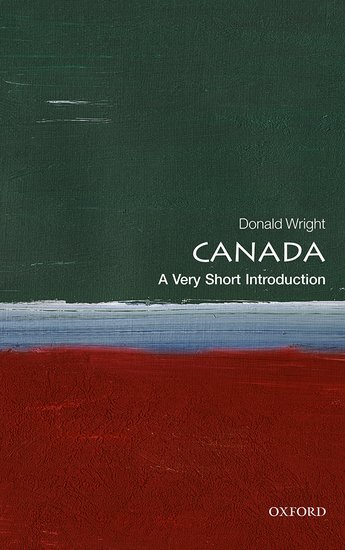Home >
A Very Short Introduction >
Canada (Geography)
A Very Short Introduction | Geography
Canada
ISBN: 9780198755241
Series: A Very Short Introduction
Canada (Geography)
A Very Short Introduction Canada (Geography) Media > Books > Non-Fiction > Education Books Expect Delays of Up to 4 Weeks| Order Below |
ISBN
9780198755241 (10-digit ISBN: 0198755244)
- Description
- Key Features
- Series Description
- Table of Contents
- Draws on history, politics, and literature to introduce the identities and realities of modern Canada
- Explores how Canada maintains national diversity through bilingualism, multiculturalism, and federalism
- Discusses the ongoing reconciliation with Canada's Indigenous peoples
- Considers Canada's historical relationship to Great Britain, and its ongoing relationship with the United States
Canada is not one nation, but three: English Canada, Quebec, and First Nations. Yet as a country Canada is very successful, in part because it maintains national diversity through bilingualism, multiculturalism, and federalism. Alongside this contemporary openness Canada also has its own history to contend with; with a legacy of broken treaties and residential schools for its Indigenous peoples, making reconciliation between Canada and First Nations an ongoing journey, not a destination.
Drawing on history, politics, and literature, this Very Short Introduction starts at the end of the last ice age, when the melting of the ice sheets opened the northern half of North America to Indigenous peoples, and covers up to today's anthropogenic climate change, and Canada's climate politics. Donald Wright emphasizes Canada's complexity and diversity as well as its different identities and its commitment to rights, and explores its historical relationship to Great Britain, and its ongoing relationship with the United States. Finally, he examines Canada's northern realities and its northern identities.
Oxford's Very Short Introductions series offers concise and original introductions to a wide range of subjects--from Islam to Sociology, Politics to Classics, Literary Theory to History, and Archaeology to the Bible.
Not simply a textbook of definitions, each volume in this series provides trenchant and provocative--yet always balanced and complete--discussions of the central issues in a given discipline or field. Every Very Short Introduction gives a readable evolution of the subject in question, demonstrating how the subject has developed and how it has influenced society. Eventually, the series will encompass every major academic discipline, offering all students an accessible and abundant reference library.
Whatever the area of study that one deems important or appealing, whatever the topic that fascinates the general reader, the Very Short Introductions series has a handy and affordable guide that will likely prove indispensable.
Please note: As this series is not ELT material, these titles are not subject to discount.
List of illustrations
Introduction
1: Beginnings
2: Dispossessions
3: Nationalisms
4: Rights
5: Borders
6: Norths
Conclusion
Further reading
Index
Canada is not one nation, but three: English Canada, Quebec, and First Nations. Yet as a country Canada is very successful, in part because it maintains national diversity through bilingualism, multiculturalism, and federalism. Alongside this contemporary openness Canada also has its own history to contend with; with a legacy of broken treaties and residential schools for its Indigenous peoples, making reconciliation between Canada and First Nations an ongoing journey, not a destination.
Drawing on history, politics, and literature, this Very Short Introduction starts at the end of the last ice age, when the melting of the ice sheets opened the northern half of North America to Indigenous peoples, and covers up to today's anthropogenic climate change, and Canada's climate politics. Donald Wright emphasizes Canada's complexity and diversity as well as its different identities and its commitment to rights, and explores its historical relationship to Great Britain, and its ongoing relationship with the United States. Finally, he examines Canada's northern realities and its northern identities.
Key Features
- Draws on history, politics, and literature to introduce the identities and realities of modern Canada
- Explores how Canada maintains national diversity through bilingualism, multiculturalism, and federalism
- Discusses the ongoing reconciliation with Canada's Indigenous peoples
- Considers Canada's historical relationship to Great Britain, and its ongoing relationship with the United States
Series Description
Oxford's Very Short Introductions series offers concise and original introductions to a wide range of subjects--from Islam to Sociology, Politics to Classics, Literary Theory to History, and Archaeology to the Bible.
Not simply a textbook of definitions, each volume in this series provides trenchant and provocative--yet always balanced and complete--discussions of the central issues in a given discipline or field. Every Very Short Introduction gives a readable evolution of the subject in question, demonstrating how the subject has developed and how it has influenced society. Eventually, the series will encompass every major academic discipline, offering all students an accessible and abundant reference library.
Whatever the area of study that one deems important or appealing, whatever the topic that fascinates the general reader, the Very Short Introductions series has a handy and affordable guide that will likely prove indispensable.
Please note: As this series is not ELT material, these titles are not subject to discount.
EASY ORDER FORM
PRICES LISTED INCLUDE CONSUMPTION TAX
Price Before Tax:
¥1,790


